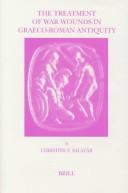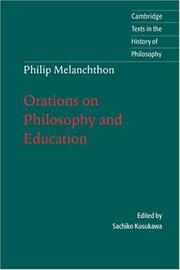| Listing 1 - 7 of 7 |
Sort by
|

ISBN: 9004114793 9004377484 Year: 2000 Volume: 21 Publisher: Boston : Brill,
Abstract | Keywords | Export | Availability | Bookmark
 Loading...
Loading...Choose an application
- Reference Manager
- EndNote
- RefWorks (Direct export to RefWorks)
In this investigation of the treatment of battle trauma in antiquity, 'treatment' is used in a double sense, both as actual medical treatment and literary 'treatment' in non-medical sources. Part I deals with the practical, medical aspects of the topic: the types of wounds likely to result from a battle, their surgical and pharmacological treatment, the question of medical services in ancient armies, medical terminology and the availability of medical knowledge. Part II discusses the use of scenes of wounding and wound treatment in literature, and Part III is a survey of the archaeological evidence. This is the first monograph to examine the topic in all its different aspects; it should be of interest to classicists, medical historians and military historians.
War wounds --- Surgery, Military --- Medical technology --- Medicine, Greek and Roman --- Medicine, Military --- Blessures de guerre --- Chirurgie militaire --- Technologie médicale --- Médecine grecque et romaine --- Médecine militaire --- Treatment --- History --- History. --- Traitement --- Histoire --- Technologie médicale --- Médecine grecque et romaine --- Médecine militaire --- War injuries --- Wounds and injuries --- War casualties --- Military surgery --- Military medicine --- Medicine --- Medicine, Naval --- Military hospitals --- Military hygiene --- War --- Health care technology --- Health technology --- Technology --- Treatment&delete& --- Medical aspects --- Relief of sick and wounded --- Medical technology. --- Medicine, Greek and Roman. --- Medicine, Military. --- Surgery, Military. --- Greek medicine --- Medicine, Roman --- Medicine, Unani --- Roman medicine --- Tibb (Medicine) --- Unani medicine --- Unani-Tibb (Medicine) --- Medicine, Ancient --- Treatment. --- Greece. --- Rome (Empire) --- al-Yūnān --- Ancient Greece --- Ellada --- Ellas --- Ellēnikē Dēmokratia --- Elliniki Dimokratia --- Grčija --- Grèce --- Grecia --- Gret͡sii͡ --- Griechenland --- Hellada --- Hellas --- Hellenic Republic --- Hellēnikē Dēmokratia --- Kingdom of Greece --- République hellénique --- Royaume de Grèce --- Vasileion tēs Hellados --- Xila --- Yaṿan --- Yūnān --- Rim --- Roman Empire --- Roman Republic --- Rome --- Romi (Empire) --- Byzantine Empire --- Italy

ISBN: 0521586771 Year: 1999 Publisher: Cambridge Cambridge University press
Abstract | Keywords | Export | Availability | Bookmark
 Loading...
Loading...Choose an application
- Reference Manager
- EndNote
- RefWorks (Direct export to RefWorks)
Philosophy --- Education --- Early works to 1800. --- Children --- Education, Primitive --- Education of children --- Human resource development --- Instruction --- Pedagogy --- Schooling --- Students --- Youth --- Civilization --- Learning and scholarship --- Mental discipline --- Schools --- Teaching --- Training --- Philosophy&delete& --- Early works to 1800

ISBN: 9781139164139 9780521583503 9780521586771 0585376956 9780585376950 1139164139 0521583500 0521586771 0511002009 9780511002007 Year: 1999 Publisher: Cambridge : Cambridge University Press,
Abstract | Keywords | Export | Availability | Bookmark
 Loading...
Loading...Choose an application
- Reference Manager
- EndNote
- RefWorks (Direct export to RefWorks)
Philip Melanchthon (1497-1560), humanist and colleague of Martin Luther, is best known for his educational reforms, for which he earned the title Praeceptor Germaniae (the Teacher of Germany). His most influential form of philosophical writing was the academic oration, and this volume, first published in 1999, presents a large and wide-ranging selection of his orations and textbook prefaces translated into English. They set out his views on the distinction between faith and reason, the role of philosophy in education, moral philosophy, natural philosophy, astronomy and astrology, and the importance of philosophy to a true Christian, as well as his views on Classical philosophical authorities such as Plato and Aristotle and on contemporaries such as Erasmus and Luther. Powerfully influential in their time, inspiring many Protestant students to study philosophy, mathematics and natural philosophy, they illuminate the relationship between Renaissance and Reformation thought.
Philosophy --- Education --- Philosophy & Religion --- Children --- Education, Primitive --- Education of children --- Human resource development --- Instruction --- Pedagogy --- Schooling --- Students --- Youth --- Civilization --- Learning and scholarship --- Mental discipline --- Schools --- Teaching --- Training --- Early works to 1800 --- Arts and Humanities
Digital
ISBN: 9781139164139 Year: 1999 Publisher: Cambridge Cambridge University Press
Abstract | Keywords | Export | Availability | Bookmark
 Loading...
Loading...Choose an application
- Reference Manager
- EndNote
- RefWorks (Direct export to RefWorks)
Book
ISBN: 1435654137 9047425456 9781435654136 Year: 2006 Publisher: Leiden Boston Brill
Abstract | Keywords | Export | Availability | Bookmark
 Loading...
Loading...Choose an application
- Reference Manager
- EndNote
- RefWorks (Direct export to RefWorks)
Book
ISSN: 24523054 Year: 2015 Publisher: Leiden : Brill,
Abstract | Keywords | Export | Availability | Bookmark
 Loading...
Loading...Choose an application
- Reference Manager
- EndNote
- RefWorks (Direct export to RefWorks)
Multi

ISSN: 27407624 ISBN: 9782356680693 2356680691 2356681744 Year: 2021 Volume: 2 Publisher: Lyon : MOM Éditions,
Abstract | Keywords | Export | Availability | Bookmark
 Loading...
Loading...Choose an application
- Reference Manager
- EndNote
- RefWorks (Direct export to RefWorks)
L’usage de versions abrégées des œuvres littéraires de tous les domaines, de l’ouvrage de botanique à l’ensemble de l’œuvre d’un historien comme Tite-Live, est extrêmement courant dans l’Antiquité. Ces résumés ont des formes variées, qui vont des « sommaires » (periochae) à la sélection d’extraits (épitomé), en passant, entre autres, par la paraphrase ; l’absence de cadre théorique, dans le monde gréco-romain, explique une telle diversité. Les contributeurs de ce volume se sont intéressés à des cas particuliers de résumés antiques, en s’interrogeant sur les pratiques à l’œuvre dans des domaines précis : les ouvrages scientifiques et techniques (médecine, astronomie, histoire) et le contexte rhétorique et scolaire (poésie, commentaires scolaires). Ils observent, chez les Anciens, un usage surprenant, pour le scientifique moderne, du résumé. En effet certains savants, en Grèce et à Rome, au cours de la rédaction d’un ouvrage, n’hésitent pas à puiser dans des résumés, et non dans les œuvres intégrales, tandis que d’autres vont jusqu’à ajouter des éléments aux sources qu’ils abrègent, voire à « réinventer » l’œuvre qu’ils résument. Dans le contexte scolaire, les résumés ont un rôle particulièrement important, dont les épitomateurs anciens sont souvent parfaitement conscients : les suppressions et les modifications manifestent une attention particulière à tel ou tel lectorat et le résumé a ses propres enjeux dans la transmission de toutes les formes de littérature. The use of abbreviated versions of literary works from all fields of knowledge, from botany to the whole work of a historian such as Livy, was extremely common in Antiquity. These digests had various forms, ranging from “summary” (periochae) to the selection of abstracts (epitome), and passing by paraphrase; the absence of any theoretical framework, in the Greco-Roman world, explains such diversity. The contributors to this volume have been interested in studying specific cases of ancient abstracts, by…
Conferences - Meetings --- History, Ancient --- Civilization, Classical --- History --- Science, Ancient --- Language and culture --- Methodology --- History, Ancient - Sources - Congresses --- Civilization, Classical - Sources - Congresses --- History - Methodology - Congresses --- Science, Ancient - Sources - Congresses --- Language and culture - Greece - Congresses --- Language and culture - Rome - Congresses --- Classics --- Literature (General) --- résumé --- épitomé --- abrégé --- paraphrase --- poésie --- littérature scolaire --- médecine --- astronomie --- histoire --- summary --- epitome --- abstract --- poetry --- school litterature --- medicine --- astronomy --- Greece. --- Rome (Empire)
| Listing 1 - 7 of 7 |
Sort by
|

 Search
Search Feedback
Feedback About
About Help
Help News
News